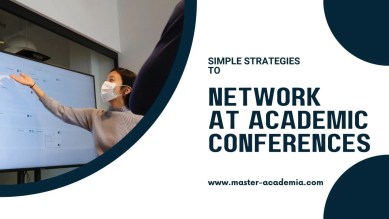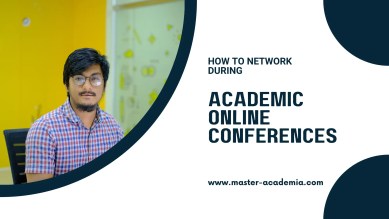
Strong relationships with other academics can greatly influence one’s career trajectory. While networking is important, many networking activities only result in superficial connections. Through shared activities, however, meaningful connections can be formed. Shared activities are key to establishing strong academic networks.
Contents
The importance of networking in academia
Once upon a time, many academics believed that networking is for businesses only. Today, the idea that networking has no place in academia, is outdated. And it is fair to say that networking in academia is as important as it is in other sectors.
Academics can grow their professional networks through a diverse range of activities. These activities include, for instance, formal membership in professional organisations, active participation in conferences, maintaining profiles on academic networking sites, or using social media.
A strong network can be a valuable source of information. This information can be knowledge within a discipline or research field. But it can also involve career prospects, such as job openings that are not advertised widely.
A strong network can also provide valuable opportunities for collaboration, in terms of co-authored publications, joint funding applications, etcetera.
There is scientific evidence of the positive effects of academic networks. A recent study by Heffernan (2021) in the journal Higher Education Research & Development, is one example. Its title: Academic networks and career trajectory: ‘There’s no career in academia without networks’.
Networking challenges for PhD students
Networking is also criticised. Some even go so far as to say that most networking events are a waste of time. The main critique is that most networking activities only lead to shallow, superficial results.
Maybe you added someone on LinkedIn, or you had a short chat with someone at a conference? Connections like that are less likely to influence your career.
For PhD students, networking challenges are even more severe. People have hundreds of LinkedIn connections. Why would you, as a PhD student, stand out? And professors in your field, who speak with hundreds of people at a conference, might forget about you despite chatting with you for two minutes.
Additionally, PhD students might feel intimidated to approach others. Particularly those ‘higher in rank’, such as professors.
PhD students might also be insecure to talk about their research, not having made any ground-breaking discoveries (yet). And they might feel uncomfortable with chitchatting, especially if they are introverts.
Knowing that networking is important, but not knowing how and where to start, can create a stressful situation for PhD students.
Frankly, academia can be overwhelming. PhD students already have to do so many things. Networking, as a slightly daunting and very abstract task, is easy to push aside.
Overcoming networking challenges through shared activities
Despite the challenges of networking, it is beneficial to start expanding your academic network from the beginning.
To ensure that networking results in strong and meaningful connections, it is sensible to prioritise quality over quantity. The number of connections you have, for instance, on linked is irrelevant. What is much more important is to have meaningful relationships with several scholars within, and beyond, your current institution.
Furthermore, feeling intimidated when it comes to networking can be mitigated by participating in a shared activity. Have you ever been on a blind date, where you just sat awkwardly opposite each other and did not know what to talk about? On the other hand, playing a game or going to a museum on a first date, is much more comfortable.
The same is true for academic networking:
Engaging in a shared activity takes the pressure off networking. It provides you with a topic of conversation, allows you to relax, and consequently be more authentic.
The important things, like your research or academic field of interest, will most likely still be a topic of discussion. But in a more comfortable setting.
Why shared activities create stronger academic networks
When networking, it is always better to focus on building a relationship, instead of trying to ‘sell yourself’. Shared activities can play a huge role in this:
Shared activities allow you to connect on a deeper level, create more lasting memories, and help you to stand out.
During a shared activity, you can get to know someone much better than just in a formal conversation. After all, whether you get along on a social level is a good indicator of whether you could collaborate successfully on a professional level as well.
Furthermore, shared activities lead to a higher chance that someone remembers you.
There is, for instance, a big difference in receiving an email stating “My name is … . We met at the conference in June” versus “My name is … . You might remember me from the excursion to Central Park as part of the PhD seminar in…“.
And lastly, depending on the shared activity, the person you would like to include in your network can see you ‘in action’. Maybe you are presenting as part of a workshop. Or maybe you organised the activity yourself, which allows you to showcase your leadership potential and proactive nature.
Examples of shared activities in academia
There are plenty of examples that would qualify as shared activities in academia. Some of the most common ones are:
- Conference sessions. Conference sessions are a common format at academic conferences, and often include 4-6 presentations surrounding a specific theme. When applying to a conference, you can often either submit a paper abstract, or a proposal for a conference session. The latter often requires you to reach out to potential presenters for the session in advance. Do you come across the same names during your literature review over and over again? Might it be an idea to organise a conference session bringing them all together? It is certainly worth a try.
- Seminars. In contrast to conference sessions, seminars might provide more time for in-depth discussions and exchanges among a small group of people. Are you keen to connect to someone who lives on the other side of the world? Seminars can be held online or in person, so there are plenty of opportunities.
- Workshops. There are all kinds of useful workshops in academia. They can be workshops in the form of summer or winter schools for PhD students working on a specific topic, or within a certain discipline. Or they can be workshops that focus on certain skills or research methods. Looking for opportunities to improve your work is always good. So why not connect it to some serious networking?
- Webinars. With online work on the rise, webinars are becoming an increasingly popular method for research discussion and dissemination. If you have anyone in mind who you would like to include in your network, maybe there is an opportunity to invite him or her to present or to take on the role of a discussant, during a webinar.
- Fieldtrips. In many academic disciplines, field trips can be an interesting option to leave your desk for a while and to explore a project or phenomenon in real life. It becomes even more interesting if field trip participants can share their expertise, and connect it to their observations during a field trip. Who could you strategically invite for such a trip?
Organising a shared activity as a PhD student
Organising a shared activity is always a good idea, as it also improves your CV and helps you to establish an all-round academic profile. However, networking should never be the only objective!
When thinking about organising a shared activity for networking purposes, always be strategic and connect the activity to your ongoing work.
“Kill two birds with one stone”, so to speak. For instance, by organising a shared activity that addresses a challenge that you encounter in your PhD. Or by setting up a workshop on a method that you use in your work.
You also do not have to organise something alone. You can ask for help, or for example, offer your supervisors to help them with ongoing activity.
Or you can team up with your peers, for instance, to organise a workshop that will benefit all your theses and invites several instructors and presenters.
Your time is precious. It should always make sense why you organise something, and how it connects to your research.




